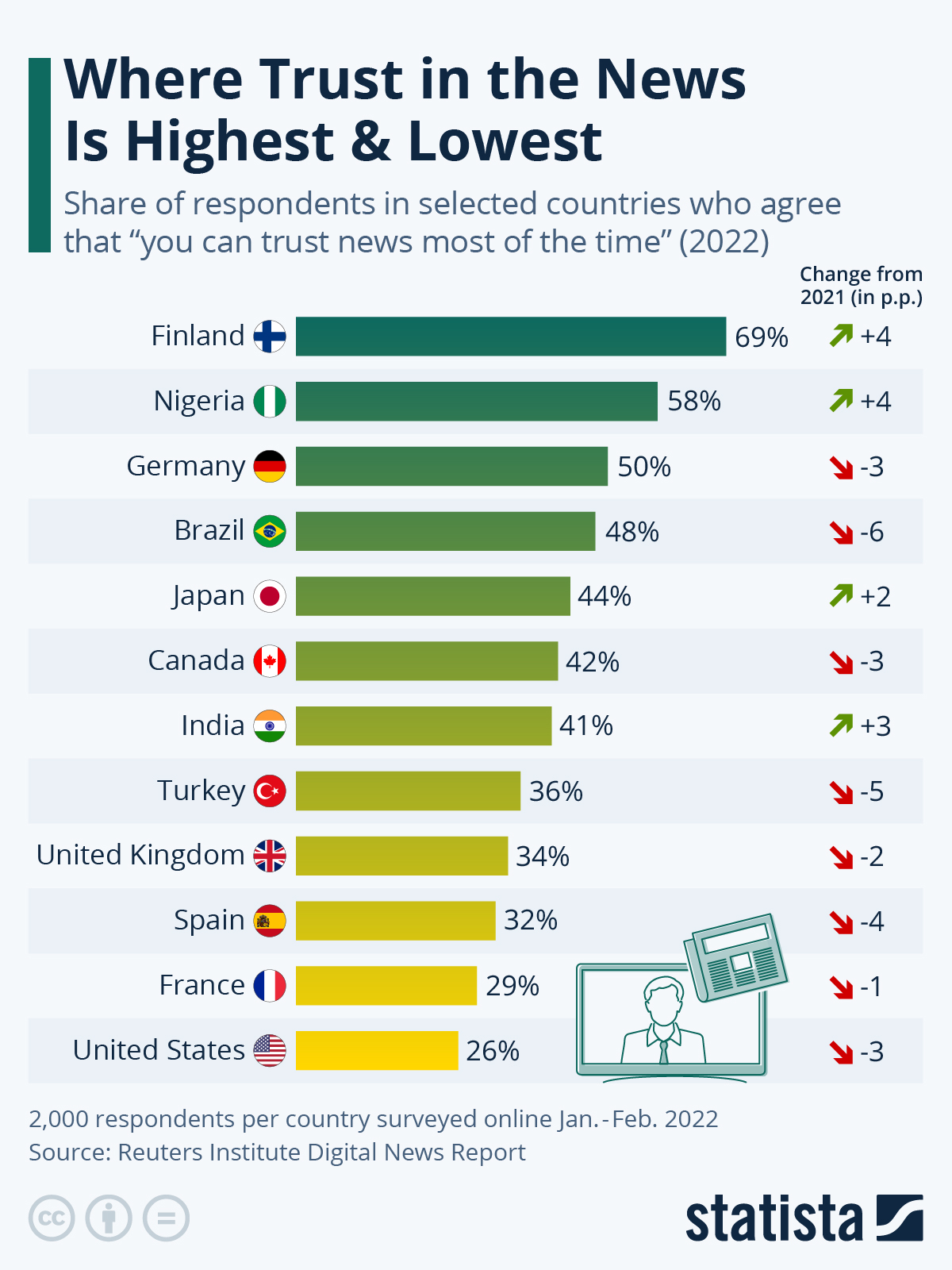
Trust in news has fallen in many countries around the world, following a temporary increase during the peak Covid-19 pandemic years, albeit still remaining higher than before the health crisis began.
This is according to the Reuters Institute Digital News Report 2022, which polled 93,000 consumers in 46 markets about a range of digital news topics ranging from perceptions of media coverage of the war in Ukraine to the changing habits of younger consumers as well as where people go for climate news.
Overall trust in the news fell in 21 out of the 46 markets analyzed, while 18 markets remained at a similar level and only seven saw an uptick.
 You will find more infographics at Statista
You will find more infographics at Statista
Finland had the highest share of respondents agreeing "you can trust news most of the time" at 69 percent which marks a 4 percentage point increase since the last edition of the report. The United States made little progress and is still rock bottom of the ranking, along with Slovakia, with only 26 percent of people trusting the news most of the time - a 3 percentage point decrease on last year.
In Latin America, trust was down in Brazil (-6 percentage points) and Colombia (-3) as of February 2022, but at the same level or saw slight improvements in other countries. Meanwhile, of the analyzed countries in Africa, South Africa (+9) and Nigeria (+4) saw improvements, while Kenya saw a decrease (-4). In Asia, trust in news fell in Malaysia (-5) and Taiwan (-4) but grew in the Philippines (+5) and Japan (+2).
According to the report, while the majority of people across countries remain engaged and use the news regularly, nations with a lower level of trust in news such as the United States (26 percent), United Kingdom (34 percent), France (29 percent) and Slovakia (26 percent) also tended to see some of the highest levels of selective avoidance and declining interest in it. Reasons cited for selective news avoidance - choosing to ration or limit export to news or certain types of news - include being put off by the repetitiveness of the news agenda, feeling worn out by the news, as well as that it brings down their mood, leads to feelings of powerlessness, is too hard to understand or that it can’t be trusted, among others.
Trust in news has fallen in many countries around the world, following a temporary increase during the peak Covid-19 pandemic years, albeit still remaining higher than before the health crisis began.
This is according to the Reuters Institute Digital News Report 2022, which polled 93,000 consumers in 46 markets about a range of digital news topics ranging from perceptions of media coverage of the war in Ukraine to the changing habits of younger consumers as well as where people go for climate news.
Overall trust in the news fell in 21 out of the 46 markets analyzed, while 18 markets remained at a similar level and only seven saw an uptick.
 You will find more infographics at Statista
You will find more infographics at Statista
Finland had the highest share of respondents agreeing “you can trust news most of the time” at 69 percent which marks a 4 percentage point increase since the last edition of the report. The United States made little progress and is still rock bottom of the ranking, along with Slovakia, with only 26 percent of people trusting the news most of the time – a 3 percentage point decrease on last year.
In Latin America, trust was down in Brazil (-6 percentage points) and Colombia (-3) as of February 2022, but at the same level or saw slight improvements in other countries. Meanwhile, of the analyzed countries in Africa, South Africa (+9) and Nigeria (+4) saw improvements, while Kenya saw a decrease (-4). In Asia, trust in news fell in Malaysia (-5) and Taiwan (-4) but grew in the Philippines (+5) and Japan (+2).
According to the report, while the majority of people across countries remain engaged and use the news regularly, nations with a lower level of trust in news such as the United States (26 percent), United Kingdom (34 percent), France (29 percent) and Slovakia (26 percent) also tended to see some of the highest levels of selective avoidance and declining interest in it. Reasons cited for selective news avoidance – choosing to ration or limit export to news or certain types of news – include being put off by the repetitiveness of the news agenda, feeling worn out by the news, as well as that it brings down their mood, leads to feelings of powerlessness, is too hard to understand or that it can’t be trusted, among others.
Loading…





